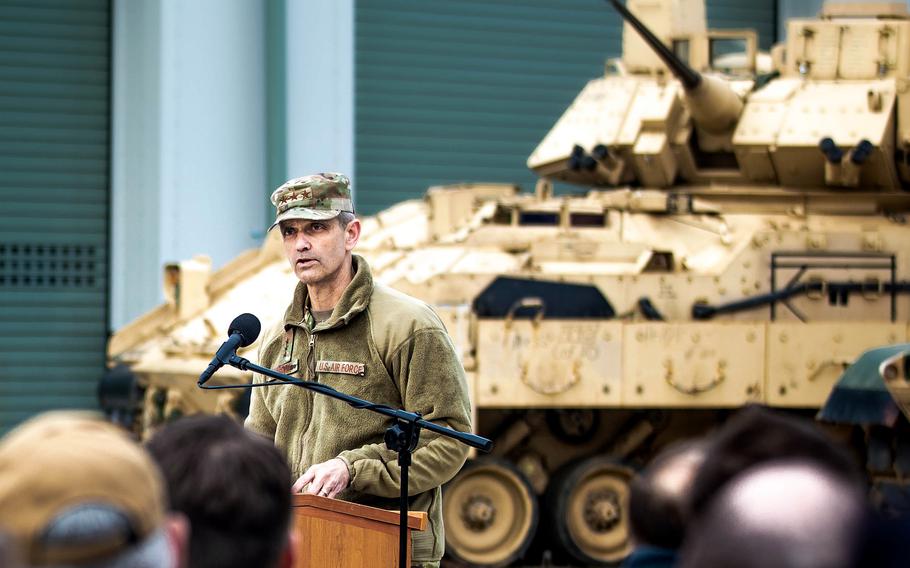
U.S. Air Force Lt. Gen. Steven L. Basham, the U.S. European Command's deputy commander, speaks at Air Base Powidz, Poland, April 5, 2023. Basham said recently that some NATO allies don't grasp the stakes involved when it comes to dealing with Russia. (Agustin Montanez/U.S. Air Force)
STUTTGART, Germany — The United States and its allies must prepare for a generational struggle with Russia that will endure for years regardless of how the war in Ukraine turns out, a three-star American general in Europe said this week.
Lt. Gen. Steven Basham, during an interview at his U.S. European Command headquarters in Stuttgart, said a top concern is that not everyone inside the NATO alliance grasps the magnitude of the stakes involved when it comes to dealing with Russia.
“If I were other countries out there, I’d be very worried,” Basham said Wednesday. “And I’m hoping that’s actually what the alliance really starts to understand. This is not about Ukraine. It’s about Russia.”
Basham’s warning comes as he wraps up two years of running day-to-day operations as EUCOM’s deputy commander. He held the same job at U.S. Air Forces Europe and Africa headquarters when Russia launched its February 2022 full-scale invasion of Ukraine.
Months before Russian forces began mounting on Ukraine’s border under the pretext of drills, it had already become clear to U.S. military leaders that Russian President Vladimir Putin was preparing to invade, he said.
“There are just certain things that you watch, and a military will do certain things if they’re actually going to go into conflict,” Basham said. “We won’t talk about this (intelligence) here. But there are clear signals.”
Those signals were evident as early as the summer of 2021, he said.
Although there’s no end in sight to the war in Ukraine, now in its third year, a Russian defeat there wouldn’t mean an end to the threat Moscow poses to the Continent, Basham said.
“While we accept that here (at EUCOM headquarters), I don’t think others fully understand that. … It could end either good with Ukraine or bad with Ukraine, but it doesn’t go away with Ukraine,” Basham said.
For many of the U.S.’s key allies in NATO, Russia’s invasion was a jolt that upended old assumptions about security in Europe. While the Kremlin’s initial armed incursion in Ukraine in 2014 also set off alarms, countries such as Germany were largely dismissive of the idea that Russia posed a major threat.
A reliance on cheap Russian gas and related economic ties also factored into Germany’s relaxed approach in the years following Moscow’s 2014 land grab.
“I can unequivocally say that, in hindsight, it would’ve been prudent to have a more robust response to the annexation of Crimea,” Chancellor Olaf Scholz admitted in a September 2022 interview with German radio.
Since Russia’s February 2022 invasion, there have been encouraging signs among allies, Basham said, pointing to a larger number of NATO members hitting the alliance’s benchmark of dedicating 2% of gross domestic product to military matters.
Yet militaries need to move with more urgency when it comes to energizing a defense industrial base, he said.
Top allied officials have conceded that supporting Ukraine has taken a toll on weapons stockpiles. The issue has become a top priority for NATO, with Secretary-General Jens Stoltenberg emphasizing the need for government to work with industry on ramping up production.
Basham said he is worried that a lingering status quo mindset persists.
“What we have to do right now is realize that every minute is precious,” Basham said.
Russia’s economy is already on a wartime footing, which has enabled the Kremlin to absorb the losses taken on the battlefield, both in manpower and equipment.
EUCOM chief Gen. Christopher Cavoli, who also serves as NATO’s supreme allied commander, told lawmakers in April that the Russian military is larger than it was at the start of the war.
The question is whether Russia, should it come to a negotiated settlement in Ukraine, would pivot from its military footing.
“They’ve industrialized their nation to a wartime economy. Would they reverse that and go the other direction? I think the assessment is ‘no,’” Basham said. “As a matter of fact, that’s actually what’s keeping their economy going.”
EUCOM’s forecast is that Russia will remain on its current trajectory for “a long, long time,” Basham said.
While allies have a window to prepare for potential aggression in Eastern Europe, it’s not clear how big that opening is, he said.
“If it’s two years, five years, whatever, just start moving on it,” he said.
In the meantime, NATO is acting on new regional defense plans that will have implications for U.S. forces in Europe, Basham said.
The planning harkens back to the Cold War, when units assigned to Europe knew what cities and towns they would be operating in should the Soviet Union invade.
That type of operational planning fell by the wayside after the collapse of the USSR. Now it’s back.
For troops, that means learning all the roads and bridges they’ll need to cross if fighting breaks out. “You have to actually walk that terrain,” Basham said.